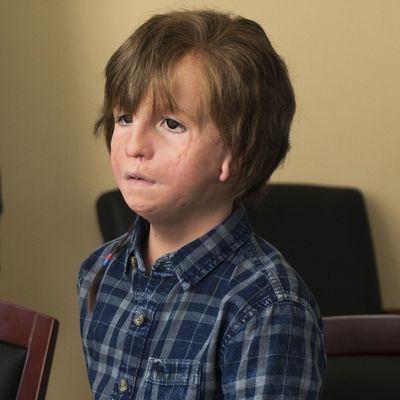
The tolerance drama Wonder centers on August (Auggie) Pullman (played by Jacob Tremblay, of Room), who is born with congenital facial deformities and, after years of being taught at home, is lovingly but tremulously compelled to go to a private New York middle school. He is predictably shunned and, in some cases, ridiculed, resulting in much grief for his mother, Isabel (Julia Roberts); father, Nate (Owen Wilson); and older sister, Via (Izabela Vidovic). But slowly — with many ups and downs — Auggie comes in contact with the better angels of our nature, even our notoriously mean-spirited middle-school nature.
Wonder is the sort of movie that seasoned cynics dread, but the best-selling book and its sequels by R.J. Palacio are written in a matter-of-fact style (Auggie has largely come to terms with his face) that can make you cry by indirection. The filmmakers have mostly taken their cues from Palacio. Mostly. Okay, only somewhat. Shots of noble people are held too long and the music tugs insistently on our heartstrings. But director Stephen Chbosky did the exquisite adaptation of his own YA novel, The Perks of Being a Wallflower, and the dread of isolation comes naturally to him. And while screenwriter Steve Conrad wrote Ben Stiller’s unforgivably mush-brained The Secret Life of Walter Mitty, his script for The Pursuit of Happyness evoked without undue sentimentality a parent’s primal terror of homelessness. Both are well-versed in unhappyness.
It helps that all through the movie there are details and lines (many from the book) that put a complicated spin on the ability to cope. (It’s not just a matter of being strong. You have to be smart.) Auggie has had 27 surgeries since he was born, and the Pullmans have them hanging on the wall, an art project. You know they faced a choice: Try to forget those grueling episodes or embrace the past, wear it with honor. Via (short for Olivia) is inadvertently but persistently ignored as her parents dwell on her brother’s well-being, but musing on the two genes (one from each parent) that gave Auggie his face, she tells a friend, “He won the lottery. In another world, I’d look like him.” Roberts’s Isabel — who asked God not to let the other kids be cruel — greets Auggie’s arrival with an actual friend, Jack Will (Noah Jupe), with a rapid range of expressions, from confusion to shock to happiness to wonder. It’s very Julia, but very real.
I hesitate to point out that three of the movie’s first sensitive responders are black: the ethics-oriented teacher, Mr. Brown (Daveed Diggs); Summer (Millie Davis), who sits beside Auggie at lunch; and Justin (Nadji Jeter), the high-school violin player who’s instantly smitten with Via and encourages her to try out for the school play, Our Town. The obvious implication is that black people can relate to Auggie’s alienation in a way the privileged white kids can’t. But that implication isn’t underlined — for the best. In any case, Jeter’s playful rapport with Vidovic’s Via is irresistible, and Diggs’s daily “precepts” (which occupy their own book) are beacons amid the sad fog. “When given a choice between being right and being kind, choose kind,” is one. Remember that, commenters.
Wonder has an overflowing humanism that extends to less-sympathetic characters, who at moments take up the point of view (and narration) from Auggie. Miranda (Danielle Rose Russell) is Via’s best friend, who has suddenly abandoned her for a more popular clique, and midway through, Miranda explains what happened at summer camp that made her turn away. It’s a bit of a cheat, insofar as the narration is like their therapy: By talking it all out, they prime themselves for redemption. But I like the impulse to show that “everyone has his or her reasons” for behaving badly — though the filmmakers don’t extend that humanist courtesy to the rich parents of the class bully. (Like good libertarians, they believe it’s perfectly natural for the wealthy and healthy to mock the less fortunate, who obviously didn’t work hard enough not to suffer facial deformities.)
As he proved in Room, Tremblay can convey worlds of emotions through understatement. Here, he shows that tilt of a head (generally down), the angle of a gaze, and the volume of speech (generally low) can be more eloquent than any expression. He uses that face the ways Greeks used masks: We project much on it. As Via, Vidovic is instantly lovable, having the movie’s second most open visage — running, of course, far behind Roberts, who face runneth over, but in a nice way. Wilson conjures a lot of pathos by simply looking sad and ineffectual.
Wonder is shot simply, without fuss, and with a piano-heavy score by Marcelo Zarvos that is sometimes perfect and sometimes too plaintive, meant to signal Auggie’s beautiful little soul. I could have done without all the inspirational pop songs, though I can hardly begrudge a student choir singing the Polyphonic Spree’s “Reach for the Sun” (with the lovely refrain, “Follow the day”) in the final scene. The filmmakers get away with a few cameos by Auggie’s quasi-soul mate, Chewbacca, chiefly by underselling them. And though one’s eyes might roll on hearing that the school play is Our Town, there’s a reason that work has survived so many years and fashions in drama — it’s a true American masterpiece, unrivaled in its mixture of tenderness and stoicism.
On The X-Files, Fox Mulder had a poster of an alien spaceship with the words, “I Want to Believe.” I wouldn’t mind having a Wonder poster with the same phrase. I want to believe that people can be good, if not instinctively good, then by following the right examples, or even through shame at doing bad. Perhaps I’ve overpraised Wonder, but as a wise man once said, “When given a choice between being right and being kind, choose kind.”





